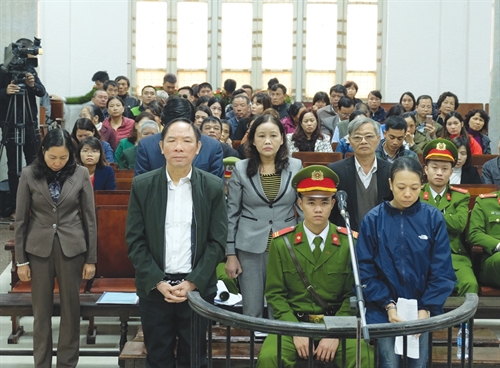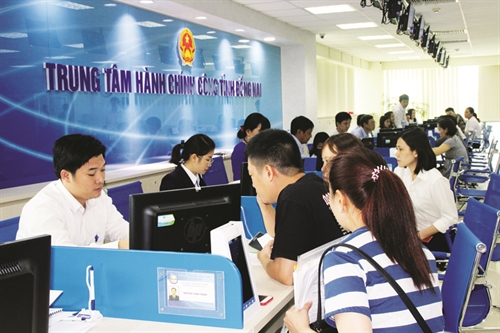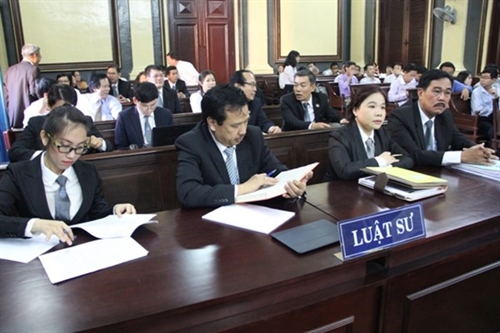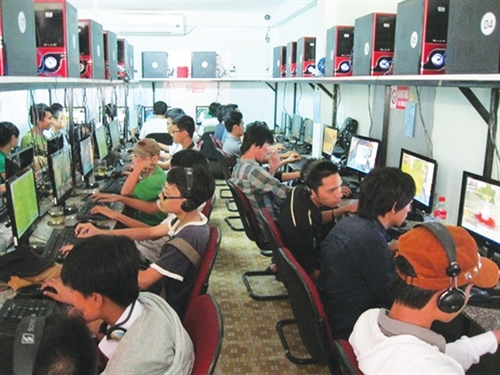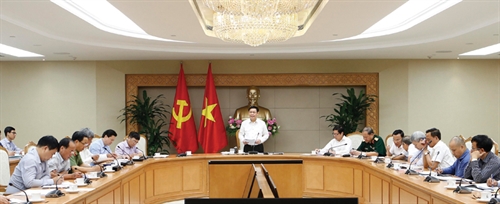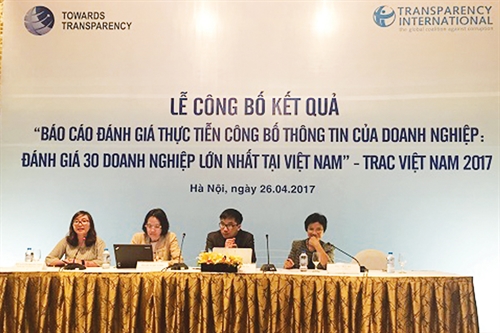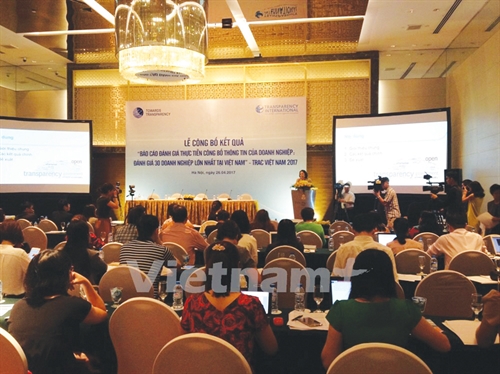Pham Thanh Trung, Vu Hai Yen, Hoang Thuy Linh
Corruption in the non-state business sector happens when someone takes advantage of his/her position in his/her enterprise for the sake of his/her personal gains[1]. In Vietnam, the 2015 Penal Code (revised in 2017) has broadened the scope of corrupt acts to include corruption occurred in the private sector. Specifically, persons with high positions and/or powers in a non-state enterprise or organization will be liable for the following criminal acts: embezzlement, receiving bribes, giving bribes and bribery brokerage. However, in order to effectively prevent and combat corruption in the private sector, holding persons committing corrupt acts liable is not sufficient enough.
 |
| Senior Lieutenant-General To Lam, Minister of Public Security and Deputy Head of the Central Anti-Corruption Steering Committee, addresses the Committee’s work meeting with Nam Dinh province’s Communist Party Committee__Photo: Van Dat/VNA |
Responsibilities of the heads for letting corrupt acts occur in their enterprises
The resolution adopted at the 3rd Plenary Session of the 10th National Party Congress on “Enhancing the Party leadership in preventing and combating corruption and wastefulness” has clearly stated the direction to “implement strict regulations on holding heads of agencies accountable for letting serious corruption or wastefulness occur.” The Party policy has been incorporated into the Law on Anti-corruption and relevant government decrees including Decree No. 107/2006/ND-CP and Decree No. 211/2013/ND-CP on responsibilities of the heads for letting corrupt acts occur in their organizations or enterprises.[2]
Necessity of regulations on responsibilities of the heads for corruption occurring in their enterprises
The head must be generally responsible for all activities of the agency or organization under his/her management and, therefore, he/she must be held liable for allowing corrupt acts to happen in his/her agency or organization[3]. In state agencies, the head is responsible for tasks assigned by the superior agency, and he/she has the highest decision-making power in the agency. The head of an agency or organization is not only subject to joint liability when corrupt acts happen but he/she also bears responsibility to direct, supervise and monitor. Similar to the public sector, the head of a non-state enterprise is the one who makes decisions of business and development strategies and therefore, he/she will be jointly liable even if he/she does not directly manage daily operations of the enterprise.
The head, as a person who manages and assigns tasks to his/her employees, must be directly liable for corrupt acts committed by those who work under his/her direct supervision.[4] In many cases, people commit corrupt acts following the command of their superior or their head. Investigation and prosecution of corruption cases show that many accused have completed corrupt acts according to the direction and command of the board of management or board of directors or the head of the enterprise.[5]
The results of the sociological study entitled “Corruption from the Perspective of Citizens, Firms and Public Officials” conducted by the Government Inspectorate in collaboration with the World Bank in 2013 revealed that 52% of enterprises surveyed implemented some anti-corruption measures, while 43% said that they had not implemented any anti-corruption measures during the last 12 months[6] because the current Law on Anti-corruption stopped short of encouraging enterprises to have an internal control mechanism to prevent embezzlement and bribery in order to establish a fair and corruption-free business culture. Therefore, regulating liability of the heads of enterprises for corruption occurring in their enterprise will force them to proactively apply anti-corruption measures, internal control mechanism, code of conduct, etc. as well as enhance the monitoring and supervision of the implementation of such anti-corruption measures.
Responsibilities of the heads for corruption occurring in their enterprises
The current legal framework of Vietnam only provides for responsibilities of the heads of state agencies and organizations, including state-owned enterprises (SOEs), but not the heads of non-state-owned enterprises.
As per Decree 107, the basis for determining the liability of the heads of SOEs is unclear and it depends on two factors: (i) whether it is a direct liability or joint liability, and (ii) the degree of corruption. According to the Law on Anti-Corruption, the head will be directly liable for corrupt acts committed by those working under his/her direct supervision and be jointly liable for corruption which happens in the business area or in the unit under the direct supervision of his/her deputy.[7] Direct liability is either disciplinary liability or penal liability while joint liability limits to disciplinary liability.[8] However, this regulation does not specify the degree of difference between joint liability and direct liability. For example, what is the degree of discipline faced by a person with joint liability compared to a person with direct liability?
The head may be considered for liability exemption and reduction or escalation of disciplinary action. Particularly, he/she may be entitled to liability exemption in case he/she cannot know about the corruption or he/she has applied necessary measures to prevent corrupt acts. The head may be exempt from disciplinary action in case he/she resigns voluntarily and gets approval by a competent authority. The head may be entitled to disciplinary reduction if (i) his/her letter of resignation has been approved; (ii) he/she has applied necessary measures to remedy the consequences of the corrupt acts, has strictly handled and timely notified the relevant authorities of the corrupt acts.[9] Such liability exemption regulations will encourage the heads of enterprises to actively apply anti-corruption measures in their enterprises. However, questions may be raised as: on what basis we can define the head “cannot know” or what are “necessary measures”. These issues have not been explained by any sub-law documents.
Determining the liability of the head (or of any other person) when he/she is related to corrupt acts is also necessary as there is a gap in the current Law on Anti-corruption. If the corrupt act constitutes a crime, the person related to the corrupt acts must be held liable for being an accomplice. According to Article 17 of the 2015 Penal Code (amended in 2017), an accomplice might be an organizer, an offender, a promoter or a supporter. In practice, an offender may act following the guidance of a leader/manager. However, such guidance is normally not given in a written form, causing difficulties in collecting the evidence needed for penalizing the head as “an accomplice” to the corruption offense. In case the committed corrupt act does not constitute a crime under the Penal code, whether the “related” acts will be considered as an offense has not been mentioned in the Law on Anti-corruption.
Penal liability of enterprises for taking part in corrupt acts
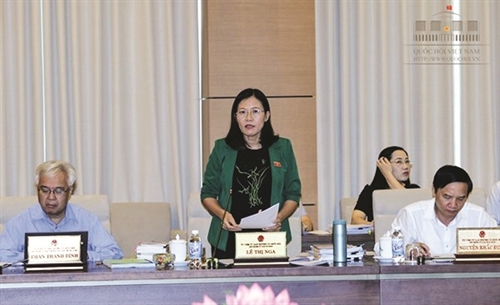 |
| Chairwoman of the NA Committee for Judicial Affairs Le Thi Nga presents a report on appraisal of the draft revised Anti-Corruption Law__Photo: https://quochoi.vn |
Current situation of enterprises’ involvement in corrupt acts
The practice of crime prevention and combat shows that in order to gain competitive edge in business, manufacturing, trading, procurement, funding, etc., commercial entities (including economic enterprises, economic groups, companies, corporations and business entities in different sectors) give bribes to persons with positions and/or powers in agencies and organizations. Such act has caused damages to the society, distorted competition, restricted the economy development and threatened the people’s trust in business integrity.[10]
According to a World Bank survey, nearly 40% of surveyed enterprises confirmed having business with state agencies and giving bribes; this illegal act prevails especially in taxation and customs sectors.[11] Notably, in 2005, there were only 56% of enterprises indicating that state authorities intentionally prolonged the time to solve their requests; this number went up to 63% in 2012.[12] Harassment of cadres and civil servants has caused enterprises and citizens to give bribes: 59% of enterprises indicated that they had to occasionally send gifts or money to civil servants. Even more seriously, more than 75% of enterprises indicated having committed bribery acts without being suggested by the state officials concerned.
Many enterprises have involved in corruption as a way to solve their problems more easily, which is shown by 63% of enterprises believing that informal charges would create “a hidden mechanism to get things done more quickly.”[13] As the majority of enterprises committed bribery acts, state officials have even more chances to ask for money and cause difficulties in solving enterprises’ requests. This is a “vicious circle” which, according to experts and enterprises, is hard to escape from.
Rationale for holding legal entities liable for corrupt acts
The 2015 Penal Code (amended in 2017) has expanded its governing scope to include corruption-related crimes in the private sector, which means persons with titles and/or authorized power in non-state enterprises shall also face penal liability for their committed embezzlement of property, receiving and giving bribes and brokering bribery. The Code also regulates the penal liability of a commercial legal entity for certain crimes with the exception of corruption-related crimes. The principle of criminalizing the liability of individuals is applicable to position-related crimes, thus only individuals who commit corrupt acts as prescribed in the 2015 Penal Code shall be prosecuted.
Therefore, apart from criminalizing the liability of persons committing corrupt acts, it is necessary to hold legal entities liable for corrupt acts, especially for receiving and giving bribes. Recognizing criminal liability of legal entities for corruption crimes will ensure:
▪ Justice in criminalizing offenders:
In practice, many important decisions are made by collective approval of Board of Members, Board of Directors or General Assembly of Shareholders. There are corrupt acts committed following the direction and instruction of the company for the company’s benefits but not for any individual’s benefit (for example, an individual may give bribe to obtain a contract for the company). Therefore, it is unfair to blame the penal liability on an individual. The lack of regulations on penal liability of legal entities for corruption has led certain crimes not to be adjudicated, causing the ineffectiveness of the crime prevention.
▪ Effective settlement of corrupt acts and handling of offenders:
Although relevant authorities have tried their best to apply administrative civil and economic measures (as prescribed in the Law on Handling of Administrative Violations and Civil Code, etc.), these measures, in fact, are not proved effective due to difficulties in proving violations and determining the consequential damage caused by violations.[14] The process of sanctioning administrative violations is quick and immediately effective but it is not considered professional, especially during the determination of damages, which leads to ineffective sanction.[15] The implementation of tort law also remains inadequate. The current regulations on legal fee applicable to civil cases and the burden of proof of damages borne by the aggrieved party have caused difficulties to enterprises, individuals and organizations to ask for compensation.[16] Thus, it is necessary to apply stronger sanctioning measures with higher deterrent effect to punish enterprises for committing corruption.
Criminal penalties on legal entities are more advantageous than administrative or civil measures. Criminal penalties are to be executed by professional agencies through transparent and strict judicial procedures and with powerful measures in proving the offenses committed and determining the damage caused by the legal entity (which cannot be done in administrative and civil procedures).[17] Penalization of corrupt acts committed by companies would make the confiscation and compensation process easier, because it brings better chances for requesting compensation and corrective actions.
▪ Implementing international commitments:
In 2003, Vietnam was among the earliest nations to sign the United Nations Convention against Corruption (UNCAC) which offers detailed and specific provisions about liability of a legal entity in corruption prevention and combat, a legal entity shall bear criminal or civil or administrative liability for their offenses (Article 26). The provision on handling a legal entity does not mean that an individual person is excluded from criminal charges when he/she commits corrupt acts on behalf of or for the personal gain of him/herself. However, Vietnam has declared its reservations of UNCAC provisions on liability of the legal entity.
Recommendations to the draft revised Law on Anti-corruption
The above analysis indicates that to better control and discipline corrupt acts in the private sector, the draft revised Law on Anti-corruption needs to:
Ensure consistency with provisions of the Penal Code regarding corrupt acts
Corruption cases in the private sector are rapidly growing, causing serious consequences to the society. Responding to corruption prevention and combat requirements, the Penal Code has extended its governing scope to corrupt acts in the private sector, including embezzlement, receiving and giving bribes and bribery brokerage. Therefore, the revised Law on Anti-corruption should contain these updates to be consistent with the previously adopted laws. Specifically, the Law on Anti-Corruption should widen the scope of the definition of “persons with positions and/or powers” to cover leaders, managers and persons who are assigned specific tasks in non-state agencies, organizations and enterprises.
Regulate responsibilities of the heads of private enterprises for corruption occurring in their enterprises
The draft revised Law on Anti-corruption needs to supplement provisions on responsibilities of the heads of non-state enterprises so that, in addition to SOEs, the heads of private enterprises will have to enhance their responsibilities for anti-corruption measures in their enterprises and contribute to the fight against corruption in general. Aside from legal provisions, company charters should also specify these responsibilities of the head. Being pressed for by both the Law on Anti-corruption and the company charter, the heads will have to strengthen the internal control and monitoring mechanism within their enterprises.-
